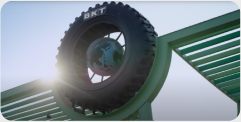What can you expect when driving your tractor across roads worldwide? First things first - are you even allowed to drive your tractor on that particular road? Licencing laws differ from country to country; read our exclusive guide here to ensure you’re on the right side of them!
Most of the time, our tractors and agricultural machinery operate in the fields, at the farm or on unsurfaced roads. However, we can’t face the day without shorter or longer travels on public roads - perhaps just to move from one field to another, or even from the shed to the working area. In these cases, we must remember that the tractor becomes an actual means of transport and road traffic regulations apply.
But what do these rules consist of, exactly? Is it necessary to have a special traffic permit for farming machinery on the road? Likewise, is a specific driving license needed? Frankly, the situation varies according to local legislation - so you need to make sure you’re in the know before traveling abroad!
But don’t fret - BKT is here to help. So, hop aboard your tractor, and follow us on this short trip around the world to see what changes from country to country.
On The Road: Terrain
Some people may mistakenly categorize all roads as one singular ‘blanket term terrain’. However, there are different types of roads which can vary across the globe - due to the grade of the land or weather conditions, for example. This can also vary depending on which region of the country you are in.
If you journey to Italy, you will generally find rugged, mountainous land, which can also affect the roads. However, this contrasts with the lowlands found more so on the Italian coasts.
Similarly, France predominantly consists of flat plains or gently rolling hills - yet the remainder is mountainous.
While we aren’t suggesting that you drive your tractor across the vast mountains, you certainly need to take into consideration the impact that the country’s overall landscape will have on the roads - and how this will affect your vehicle’s journey. In comparison, if you’re traveling on the road in the United Kingdom or United States, it’ll likely be smooth sailing, as both are renowned for their vast rolling plains - bar a few iconic mountainous areas!
Legislation & Licencing
Next up, we’re going to get down to the nitty gritty: tractor licensing in different countries. The question is: where in the world would you be allowed to drive your tractor on the road?
Let’s start out in the United States, where driver’s licenses are issued with slightly different rules per state, but commercial licenses follow a standardized federal system. Basically, it’s all a question of weight: anyone with a regular driving license can legally drive an agricultural vehicle in the fields or on the road, as long as it is below 11 tons. If the vehicle weight exceeds this limit, a Commercial Driver's License (CDS) is mandatory. A similar system is adopted in other countries such as Australia and New Zealand. The same rule goes for the United Kingdom where even 16-year-olds can drive a tractor or other farming vehicle in the fields without a class B driving license!
However, in other EU countries, the situation is slightly different. In Italy, for instance, one of the more recent regulations means that a license for professional equipment is compulsory. Tractor and agricultural machinery operators must, therefore, attend training which includes three classroom and five practical lessons.
Next, we’re jetting off to France. Here, the rules are based on the profession of the person driving the tractor. If he or she is a professional operator - such as a farm owner or employee - no document is necessary, bar the regular class B driving license. In all other cases, it is necessary to obtain a C1E license if the weight of the agricultural vehicle is between 3.5 and 7.5 tons, or alternatively, the CE license if the vehicle weighs over 7.5 tons.
Finally, let’s travel overseas to Germany, where we’re met with yet another take on agri-law. Here, the distinction is based on the vehicle class. With a class B driving license, one can drive smaller tractors up to a maximum speed of 40 km/h. For larger agricultural machinery, which reaches speeds of 60 km/h, however, the integration of a Class T driving license is mandatory.
Has your country been included in our comprehensive list? If not - which rules apply there? Are they similar to any of the above? For more insights on life aboard your tractor, check out the rest of our blog here!





